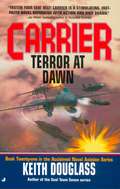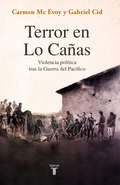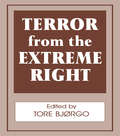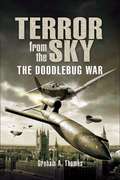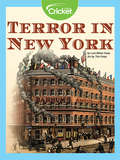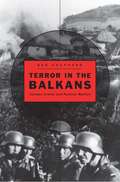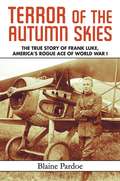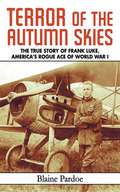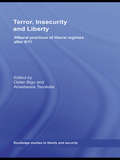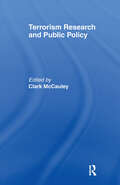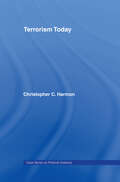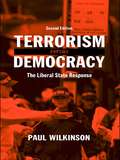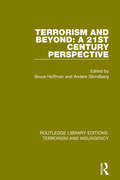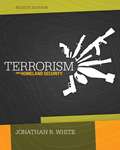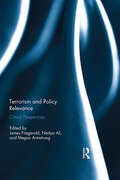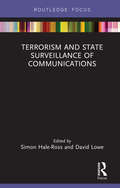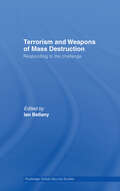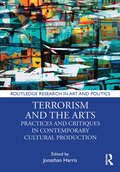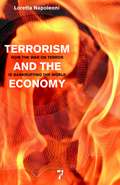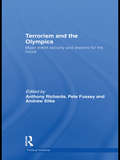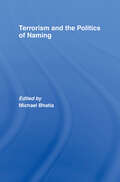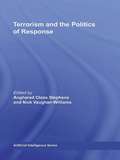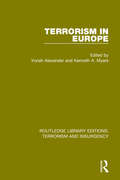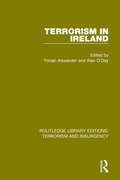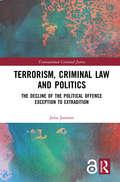- Table View
- List View
Terror at Dawn (Carrier #25)
by Keith DouglassTombstone Magruder and Carrier Battle Group Fourteen are assigned to combat domestic terrorists within U.S. borders-leaving hostile nations Iraq and North Korea with an opening they can't resist...
Terror en Lo Cañas: Violencia política tras la Guerra del Pacífico
by Carmen Mc Evoy Gabriel Patricio Cid RodríguezLa masacre que da fin a la guerra civil en Chile después de la Guerra del Pacífico Tras las guerras de la Araucanía y la Guerra del Pacífico (1879-1884), la Guerra civil se desata en Chile en 1891 donde el ejercito del presidente José Manuel Balmaceda se enfrentaba al llamado Comité Revolucionario de Santiago compuesto por montoneros. Un grupo de estos se refugia en el fundo Lo Cañas, propiedad de Carlos Walker Martínez y cerca de Santiago, donde son sometidos a terribles masacres y al incendio del lugar por un batallón de soldados a cargo del general Orozimbo Barbosa. Los autores de Terror en Lo Cañas narran y analizan la brutalidad de lo aprendido en guerras anteriores y cómo la violencia política sienta las bases para formar la sociedad chilena. Reseñas: «Alejado de las versiones heroicas de los mitos patrióticos, Terror en Lo Cañas es un relato apasionado y apasionante que pone en escena las duras realidades de las guerras de la Araucanía y del Pacífico, así como sus traumáticas consecuencias para la sociedad chilena». Hilda Sabato. Historiadora «Estas páginas estremecedoras nos remiten a una tradición de deshumanización y desprecio por “el otro” que, tristemente, sigue vigente. Como los mejores libros de historia, esta es una obra incómoda, que hurga en la mugre del pasado para echar luces sobre el presente y el futuro». Carlos Aguirre. Historiador «En este libro, Mc Evoy y Cid realizan de manera extraordinaria una de las tareas más difíciles de las ciencias sociales: vincular un evento puntual con el proceso histórico. Es decir, el evento bárbaro busca ser comprendido desde una trayectoria de barbarie. Un libro, además, muy bien escrito e ilustrado. No tiene pierde». Alberto Vergara. Doctor en Ciencias Políticas
Terror from the Extreme Right
by Tore BjørgoThis first volume in a new series comprises nine contributions originally presented at a workshop supported by the Norwegian Ministry of Foreign Affairs in Berlin in August, 1994. Topics range from right-wing violence in North America to the development, patterns, and causes of violence against fore
Terror from the Sky: The Battle Against the Flying Bombs
by Graham A. ThomasIn the summer of 1944 the Germans launched more than 10,000 flying bombs at Britain, most of them towards London. Thousands of people were killed many more injured. RAF fighter pilots flew round the clock patrols desperately trying to shoot the robot rockets down and stop them from reaching their targets.
Terror in New York
by Lois Miner HueyIn a planned conspiracy to burn down major buildings in New York City during the Civil War, eight men of the Confederacy committed acts of terrorism. They attempted to destroy the city and claim it for the South by building a "Greek fire," which is stronger than regular fire because it is caused by chemical reactions.
Terror in the Balkans: German Armies and Partisan Warfare
by Ben ShepherdGermany’s 1941 seizure of Yugoslavia led to an insurgency as bloody as any in World War II. The Wehrmacht waged a brutal counter-insurgency campaign in response, and by 1943 German troops in Yugoslavia were engaged in operations that ranked among the largest of the entire European war. Their actions encompassed massive reprisal shootings, the destruction of entire villages, and huge mobile operations unleashed not just against insurgents but also against the civilian population believed to be aiding them. Terror in the Balkans explores the reasons behind the Wehrmacht’s extreme security measures in southern and eastern Europe. Ben Shepherd focuses his study not on the high-ranking generals who oversaw the campaign but on lower-level units and their officers, a disproportionate number of whom were of Austrian origin. He uses Austro-Hungarian army records to consider how the personal experiences of many Austrian officers during the Great War played a role in brutalizing their behavior in Yugoslavia. A comparison of Wehrmacht counter-insurgency divisions allows Shepherd to analyze how a range of midlevel commanders and their units conducted themselves in different parts of Yugoslavia, and why. Shepherd concludes that the Wehrmacht campaign’s violence was driven not just by National Socialist ideology but also by experience of the fratricidal infighting of Yugoslavia’s ethnic groups, by conditions on the ground, and by doctrines that had shaped the military mindsets of both Germany and Austria since the late nineteenth century. He also considers why different Wehrmacht units exhibited different degrees of ruthlessness and restraint during the campaign.
Terror of the Autumn Skies
by Blaine PardoeFrank Luke, Jr., was an unlikely pilot. In the Great War, when fliers were still "knights of the air," Luke was an ungallant loner, a kid from Arizona who collected tarantulas, shot buzzards, and boxed miners. But during two torrid weeks in September 1918, he was the deadliest man on the Western Front. In only ten missions, he destroyed fourteen heavily-defended German balloons and four airplanes, a rampage unequaled even by the dreaded von Richtofen, and the second highest American tally of the entire war. Cocksure and constantly reprimanded, Luke was actually under arrest on the day of his final flight, but he stole a plane to join the fatal action that won him the first Congressional Medal of Honor awarded to a pilot. Blaine Pardoe retraces and refreshes Frank Luke's story through recently discovered correspondence. What emerges is a portrait of a life out of an "Old West" that was, by the late Teens, colliding with modernity. Frantic, short, and splendid, the life of Frank Luke, Jr. dramatizes the tragic intervention of an American spirit in the war that devastated Europe.
Terror of the Autumn Skies: The True Story of Frank Luke, America's Rogue Ace of World War I
by Blaine PardoeFrank Luke, Jr. was an unlikely pilot. In the Great War, when fliers were still ?knights of the air,” Luke was an ungallant loner?a kid from Arizona who collected tarantulas, shot buzzards, and boxed miners. But during two torrid weeks in September 1918, he was the deadliest man on the Western Front. In only ten missions, he destroyed fourteen heavily-defended German balloons and four airplanes, the second highest American tally in the entire war. Author Blaine Pardoe retraces and refreshes Frank Luke’s story through recently discovered correspondence. Frantic, short, and splendid, the life of Frank Luke, Jr. dramatizes the tragic intervention of an American spirit in the war that devastated Europe.
Terror, Insecurity and Liberty: Illiberal Practices of Liberal Regimes after 9/11 (Routledge Studies In Liberty And Security Ser.)
by Anastassia Tsoukala Didier BigoThis edited volume questions the widespread resort to illiberal security practices by contemporary liberal regimes since 9/11, and argues that counter-terrorism is embedded into the very logic of the fields of politics and security.Although recent debate surrounding civil rights and liberties in post-9/11 Europe has focused on the forms, provisions
Terrorism Research and Public Policy
by Clark McCauleyFirst Published in 1991. Routledge is an imprint of Taylor & Francis, an informa company.
Terrorism Today (Political Violence Ser.)
by Christopher C HarmonFirst Published in 2000. Routledge is an imprint of Taylor & Francis, an informa company.
Terrorism Versus Democracy: The Liberal State Response
by Paul Wilkinson'No one understands terrorism better than Paul Wilkinson...if policy makers read this book they will understand the problems better. If terrorists read it they will understand themselves a lot better.' - Michael Clarke, King’s College London, University of London, UK This acclaimed study examines both the new terror networks and those that have been around for decades. This new edition brings it up-to-date with the dramatic opening of the twenty-first century, with new chapters on the 9/11 attacks, the growth of international terrorism, the Al Qaeda network and the War on Terror. This text provides us with some much needed criteria for distinguishing between terrorists and freedom fighters and an explanation of the uses of terrorism as a political, social, religious and criminal weapon. Wilkinson also links the use of terrorism to a wider repertoire of struggle. He proposes a variety of possible counter-measures and valuable principles carefully distilled from the recent past to help design a response that is compatible with democratic principles, the rule of law and respect for human rights. This book is essential reading for undergraduate and postgraduate students of terrorism studies, political science and international relations, as well as for policy makers and journalists.
Terrorism and Beyond: The 21st Century (Routledge Library Editions: Terrorism and Insurgency)
by Bruce Hoffman Anders StrindbergThe papers in this special issue of Studies in Conflict and Terrorism accompanied the conference in Oklahoma in April 2000, whose purpose was to assess developments in terrorism over the preceeding two decades, map its likely future direction and propose policy recommendations and other remedial steps to counter the menace. The conference and papers address themes such as: Continuity and changes in terrorist motivations, strategies & capabilities; policy and research concerns in coping with terrorism; evaluations of the effectiveness of both international and American counterterrorism policies and capabilities.
Terrorism and Homeland Security (Eighth Edition)
by Jonathan R. WhiteWritten by acclaimed national terrorism expert Jonathan R. White, the market-leading TERRORISM AND HOMELAND SECURITY is widely recognized as the most comprehensive, balanced, and objective terrorism book available. In the Eighth Edition, White continues to provide a theoretical and conceptual framework that enables readers to understand how terrorism arises and how it functions. Packed with cutting-edge coverage, the book discusses the most sophisticated theories of the world's best terrorist analysts, while still focusing on the domestic and international threat of terrorism and the basic security issues surrounding terrorism today.
Terrorism and Policy Relevance: Critical Perspectives
by Megan Armstrong James Fitzgerald Nadya AliThis book explores the interrelationship between terrorism and policy relevance from a range of critical perspectives. In particular, it questions the politics of policy-relevance; that is, it interrogates how epistemological and practical pressures to produce "policy-relevant" research shapes prevalent understandings of (counter)terrorism, and vice-versa. It also reflects on Critical Terrorism Studies’ (CTS) relationship to policy-relevance. Should CTS eschew engagement with policy-relevance and maintain a position outside the orthodoxy, or are CTS scholars uniquely positioned to offer meaningful alternatives to contemporary counterterrorism practices? Read thus, the question of policy relevance is central to CTS’ identity and represents an essential juncture as to how associated scholarship might develop into the future.
Terrorism and State Surveillance of Communications
by David Lowe Simon Hale-RossThis book brings together leading counterterrorism experts, from academia and practice, to form an interdisciplinary assessment of the terrorist threat facing the United Kingdom and the European Union, focusing on how terrorists and terrorist organisations communicate in the digital age. Perspectives drawn from criminological, legalistic, and political sciences, allow the book to highlight the problems faced by the state and law enforcement agencies in monitoring, accessing, and gathering intelligence from the terrorist use of electronic communications, and how such powers are used proportionately and balanced with human rights law. The book will be a valuable resource for scholars and students of terrorism and security, policing and human rights. With contributions from the fields of both academia and practice, it will also be of interest to professionals and practitioners working in the areas of criminal law, human rights and terrorism.
Terrorism and Weapons of Mass Destruction: Responding to the Challenge (Routledge Global Security Studies)
by Ian BellanyThere is a widely held belief in the imminent probability of nuclear, chemical, or biological weapons of mass destruction being used by terrorists against civilian targets. This edited volume critically assesses the suggestion that one safeguard against this possibility would be to strengthen existing international prohibitions against state- level acquisition of such weapons. A glimpse of the possible potential of terrorist use of weapons of mass destruction has been seen through the actions of the Tokyo Aum group, and through the use of chlorine by insurgents in Iraq. However, the extent of the real threat posed is as yet unclear, and safeguarding against it in developing countries will not be easy. This book assembles specialists in each category of WMD in order to examine the potential of expanding the three ‘classical’ arms control treaties in order to combat the threat posed by smaller terrorist groups, and draws conclusions as to the strengths and weaknesses of this suggestion.
Terrorism and the Arts: Practices and Critiques in Contemporary Cultural Production (Routledge Research in Art and Politics)
by Jonathan HarrisThis book assesses the key definitions, forms, contexts and impacts of terrorist activity on the arts in the modern era, using historical and contemporary perspectives. Its empirical case studies include theatre, literature, music, visual art, mass media, film and the mores of ‘ordinary life.’ While its immediate reflective context is Islamic fundamentalist terrorism, the book reviews a broader range of definitions and counter-definitions of 'terrorism', 'state terrorism' and 'states of terror,' examining uses of the terms through a series of comparative analyses. Chapters focus on the intersection of these definitional questions with heuristic analysis of art forms, cultural activities and their socio-historical contexts. This book will be of interest to scholars in art history, terrorism, politics and the media, and visual culture.
Terrorism and the Economy: How the War on Terror is Bankrupting the World
by Loretta NapoleoniEconomist and best-selling author Loretta Napoleoni traces the link between the finances of the war on terror and the global economic crisis, finding connections from Dubai to London to Las Vegas that politicians and the media have at best ignored. In launching military and propaganda wars in the Middle East, America overlooked the war of economic independence waged by Al-Qaeda. The Patriot Act boosted the black market economy, and the war on terror prompted a rise in oil prices that led to food riots and distracted governments from the trillion-dollar machinations of Wall Street. Consumers and taxpayers, spurred by propaganda fears, were lured into crushing global debt. Napoleoni shows that if we do not face up to the many serious connections between our response to 9/11 and the financial crisis, we will never work our way out of the looming global recession that now threatens our way of life.While we feared that Al-Qaeda might destroy our world, Wall Street ripped it apart.
Terrorism and the Olympics: Major Event Security and Lessons for the Future (Political Violence)
by Anthony RichardsThe book aims to outline the progress, problems and challenges of delivering a safe and secure Olympics in the context of the contemporary serious and enduring terrorist threat. The enormous media profile and symbolic significance of the Olympic Games, the history of terrorists aiming to use such high-profile events to advance their cause, and Al Qaeda's aim to cause mass casualties, all have major implications for the security of London 2012. Drawing on contributions from leading academics and practitioners in the field the book will assess the current terrorist threat, particularly focusing on terrorist targeting and how the Olympics might feature in this, before addressing particular response themes such as transport security, the role of surveillance, resilient designing of Olympic sites, the role of private security, and the challenge of inter-agency coordination. The book will conclude by providing an assessment of the legacy of Olympic security to date and will discuss the anticipated issues and dilemmas of the future. This book will be of interest to students of terrorism studies, security studies, counter-terrorism and sports studies.
Terrorism and the Politics of Naming (ISSN)
by Michael BhatiaPreviously published as a special issue of Third World Quarterly, this volume assesses the nature, power, role and function of names in global politics and the international media.Names are not objective, they accrue subjective associations, for example 'Terrorist' has a very different connotation to 'Freedom-fighter'. The contributors seek the truth beneath the names assigned in an effort to remove the obscurity created by the power of 'the politics of naming' to the reality of the situation, taking examples from Al Qaeda, Russia's demonization of the Chechens and naming in the Israeli-Palestine conflict, among other important contemporary debates. Terrorism and the Politics of Naming makes a substantial contribution towards elucidating the power of naming in the discourse of conflict and will be of great interest to students and scholars of political philosophy, political theory, and politics and the media.
Terrorism and the Politics of Response (Routledge Critical Terrorism Studies)
by Nick Vaughan-Williams Angharad Closs StephensThis inter-disciplinary edited volume critically examines the dynamics of the War on Terror, focusing on the theme of the politics of response. The book explores both how responses to terrorism - by politicians, authorities and the media - legitimise particular forms of sovereign politics, and how terrorism can be understood as a response to global inequalities, colonial and imperial legacies, and the dominant idioms of modern politics. The investigation is made against the backdrop of the 7 July 2005 bombings in London and their aftermath, which have gone largely unexamined in the academic literature to date. The case offers a provocative site for analysing the diverse logics implicated in the broader context of the War on Terror, for examining how terrorist events are framed, and how such framings serve to legitimise particular policies and political practices.
Terrorism in Europe (Routledge Library Editions: Terrorism and Insurgency)
by Yonah Alexander Kenneth MyersThis study places terrorist acts in Europe in their historical perspective by examining terrorist and anarchist movements in late nineteenth century Europe. The political and legal aspects of modern terrorism are discussed in detail and the themes and variation in political terrorism are examined fully. In addition, selected case studies of contemporary terrorist movements are considered in the context of the political tradition of the particular country. A comprehensive picture of European terrorism, in its historical and more contemporary ideological and political aspects emerges from this work.
Terrorism in Ireland (Routledge Library Editions: Terrorism and Insurgency)
by Yonah Alexander Alan O'DayWhen originally published in 1984, this book was the first detailed study of terrorism in Ireland. It assesses the situation in Ireland after a decade or more of violence in the North and tests some of the assumptions about the nature of terrorism and discusses the problem in a geo-political context. The authors reflect a variety of disciplines and political outlooks and no single line of argument is offered. They examine how the issue of terrorism has been dealt with by various governments, the church, the media and individuals. The book reveals the complexity of the terrorist problem and dispels some of the myths that have grown up around Irish terrorism.
Terrorism, Criminal Law and Politics: The Decline of the Political Offence Exception to Extradition (Transnational Criminal Justice)
by Julia JanssonRecent atrocities have ensured that terrorism and how to deal with terrorists legally and politically has been the subject of much discussion and debate on the international stage. This book presents a study of changes in the legal treatment of those perpetrating crimes of a political character over several decades. It most centrally deals with the political offence exception and how it has changed. The book looks at this change from an international perspective with a particular focus on the United States. Interdisciplinary in approach, it examines the fields of terrorism and political crime from legal, political science and criminological perspectives. It will be of interest to a broad range of academics and researchers, as well as to policymakers involved in creating new anti-terrorist policies.
